Latest News
EU proposes €1.6 million aid package to support laid-off Tupperware Belgium workers
 EU proposes €1.6 million aid package to support laid-off Tupperware Belgium workers
EU proposes €1.6 million aid package to support laid-off Tupperware Belgium workers
EU unveils Digital Networks Act to boost connectivity investment and build a true single market
 EU unveils Digital Networks Act to boost connectivity investment and build a true single market
EU unveils Digital Networks Act to boost connectivity investment and build a true single market
European Parliament condemns Iran’s crackdown on protests, urges sanctions and IRGC terror listing
 European Parliament condemns Iran’s crackdown on protests, urges sanctions and IRGC terror listing
European Parliament condemns Iran’s crackdown on protests, urges sanctions and IRGC terror listing
40 years on: how Spain and Portugal’s EU membership reshaped Europe
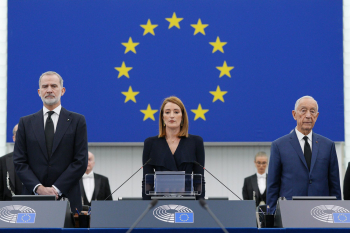 40 years on: how Spain and Portugal’s EU membership reshaped Europe
40 years on: how Spain and Portugal’s EU membership reshaped Europe
EU sets €1.9 billion humanitarian aid budget for 2026 as global needs soar
 EU sets €1.9 billion humanitarian aid budget for 2026 as global needs soar
EU sets €1.9 billion humanitarian aid budget for 2026 as global needs soar
One in four young Europeans juggle work and studies as student employment rises across the EU
 One in four young Europeans juggle work and studies as student employment rises across the EU
One in four young Europeans juggle work and studies as student employment rises across the EU
EU launches new Anti-Racism Strategy 2026–2030 to tackle discrimination across Europe
 EU launches new Anti-Racism Strategy 2026–2030 to tackle discrimination across Europe
EU launches new Anti-Racism Strategy 2026–2030 to tackle discrimination across Europe
Marine Le Pen rejects EU funds fraud claims as appeal trial puts 2027 presidential bid at risk
 Marine Le Pen rejects EU funds fraud claims as appeal trial puts 2027 presidential bid at risk
Marine Le Pen rejects EU funds fraud claims as appeal trial puts 2027 presidential bid at risk
EU Parliament to renovate Paul-Henri Spaak Building: €455 million green overhaul set for 2027–2031
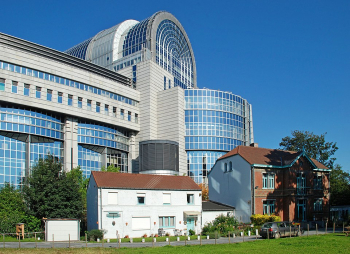 EU Parliament to renovate Paul-Henri Spaak Building: €455 million green overhaul set for 2027–2031
EU Parliament to renovate Paul-Henri Spaak Building: €455 million green overhaul set for 2027–2031
EU-funded NGO linked to online map targeting Jewish and Israeli-affiliated businesses in Catalonia
 EU-funded NGO linked to online map targeting Jewish and Israeli-affiliated businesses in Catalonia
EU-funded NGO linked to online map targeting Jewish and Israeli-affiliated businesses in Catalonia
Must Read
-
 Zurich introduces Eruv, creating a Sabbath-friendly public zone for Jewish life
Zurich has quietly drawn a new kind of line across the city — one that cannot be seen at first glance, yet carries deep religious and social meaning. Spanning severalRead More...
Zurich introduces Eruv, creating a Sabbath-friendly public zone for Jewish life
Zurich has quietly drawn a new kind of line across the city — one that cannot be seen at first glance, yet carries deep religious and social meaning. Spanning severalRead More... -
 Zurab Musinyan: “Let my case lie at door of Russian special services combating international terrorism…”
Specialized Oil-Loading Seaport Vitino captured by Russian security officials through hostage taking keeps on being a subject of carve-up and litigations by Russian and international companies....Read More...
Zurab Musinyan: “Let my case lie at door of Russian special services combating international terrorism…”
Specialized Oil-Loading Seaport Vitino captured by Russian security officials through hostage taking keeps on being a subject of carve-up and litigations by Russian and international companies....Read More... -
 Young Europeans losing faith in democracy
Recent findings from a comprehensive survey conducted by the YouGov institute for the Tui Foundation reveal a concerning trend among Europe’s youth: a growingRead More...
Young Europeans losing faith in democracy
Recent findings from a comprehensive survey conducted by the YouGov institute for the Tui Foundation reveal a concerning trend among Europe’s youth: a growingRead More... -
 World Refugee Day: Joint Statement by the European Commission and the High Representative
No country, no region in the world has been spared from the impact of COVID-19. The virus is exacerbating existing inequalities and has a disproportionate effect on refugees,Read More...
World Refugee Day: Joint Statement by the European Commission and the High Representative
No country, no region in the world has been spared from the impact of COVID-19. The virus is exacerbating existing inequalities and has a disproportionate effect on refugees,Read More... -
 World peace under strain — yet some countries still shine
As a storm of conflicts, rising militarisation and geopolitical fragmentation rattles the globe, the annual Global Peace Index 2025 paints a soberingRead More...
World peace under strain — yet some countries still shine
As a storm of conflicts, rising militarisation and geopolitical fragmentation rattles the globe, the annual Global Peace Index 2025 paints a soberingRead More... -
 Women still a minority among Flemish professors despite gains elsewhere
Women account for just one in three professors and visiting professors at Flemish universities, according to new figures released on Tuesday by Statistiek Vlaanderen.Read More...
Women still a minority among Flemish professors despite gains elsewhere
Women account for just one in three professors and visiting professors at Flemish universities, according to new figures released on Tuesday by Statistiek Vlaanderen.Read More... -
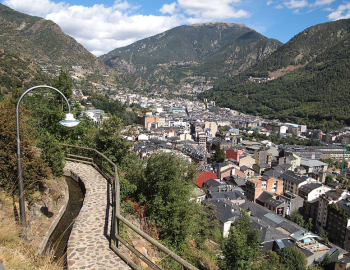 Why Andorra finds EU membership unappealing?
Andorra, a small landlocked country located in the eastern Pyrenees mountains between France and Spain, has long maintained a unique position in Europe. With a population ofRead More...
Why Andorra finds EU membership unappealing?
Andorra, a small landlocked country located in the eastern Pyrenees mountains between France and Spain, has long maintained a unique position in Europe. With a population ofRead More...
Latest News
EU proposes €1.6 million aid package to support laid-off Tupperware Belgium workers
 EU proposes €1.6 million aid package to support laid-off Tupperware Belgium workers
EU proposes €1.6 million aid package to support laid-off Tupperware Belgium workers
EU unveils Digital Networks Act to boost connectivity investment and build a true single market
 EU unveils Digital Networks Act to boost connectivity investment and build a true single market
EU unveils Digital Networks Act to boost connectivity investment and build a true single market
European Parliament condemns Iran’s crackdown on protests, urges sanctions and IRGC terror listing
 European Parliament condemns Iran’s crackdown on protests, urges sanctions and IRGC terror listing
European Parliament condemns Iran’s crackdown on protests, urges sanctions and IRGC terror listing
40 years on: how Spain and Portugal’s EU membership reshaped Europe
 40 years on: how Spain and Portugal’s EU membership reshaped Europe
40 years on: how Spain and Portugal’s EU membership reshaped Europe
EU sets €1.9 billion humanitarian aid budget for 2026 as global needs soar
 EU sets €1.9 billion humanitarian aid budget for 2026 as global needs soar
EU sets €1.9 billion humanitarian aid budget for 2026 as global needs soar
One in four young Europeans juggle work and studies as student employment rises across the EU
 One in four young Europeans juggle work and studies as student employment rises across the EU
One in four young Europeans juggle work and studies as student employment rises across the EU
EU launches new Anti-Racism Strategy 2026–2030 to tackle discrimination across Europe
 EU launches new Anti-Racism Strategy 2026–2030 to tackle discrimination across Europe
EU launches new Anti-Racism Strategy 2026–2030 to tackle discrimination across Europe
Marine Le Pen rejects EU funds fraud claims as appeal trial puts 2027 presidential bid at risk
 Marine Le Pen rejects EU funds fraud claims as appeal trial puts 2027 presidential bid at risk
Marine Le Pen rejects EU funds fraud claims as appeal trial puts 2027 presidential bid at risk
EU Parliament to renovate Paul-Henri Spaak Building: €455 million green overhaul set for 2027–2031
 EU Parliament to renovate Paul-Henri Spaak Building: €455 million green overhaul set for 2027–2031
EU Parliament to renovate Paul-Henri Spaak Building: €455 million green overhaul set for 2027–2031
EU-funded NGO linked to online map targeting Jewish and Israeli-affiliated businesses in Catalonia
 EU-funded NGO linked to online map targeting Jewish and Israeli-affiliated businesses in Catalonia
EU-funded NGO linked to online map targeting Jewish and Israeli-affiliated businesses in Catalonia
Must Read
-
 Zurich introduces Eruv, creating a Sabbath-friendly public zone for Jewish life
Zurich has quietly drawn a new kind of line across the city — one that cannot be seen at first glance, yet carries deep religious and social meaning. Spanning severalRead More...
Zurich introduces Eruv, creating a Sabbath-friendly public zone for Jewish life
Zurich has quietly drawn a new kind of line across the city — one that cannot be seen at first glance, yet carries deep religious and social meaning. Spanning severalRead More... -
 Zurab Musinyan: “Let my case lie at door of Russian special services combating international terrorism…”
Specialized Oil-Loading Seaport Vitino captured by Russian security officials through hostage taking keeps on being a subject of carve-up and litigations by Russian and international companies....Read More...
Zurab Musinyan: “Let my case lie at door of Russian special services combating international terrorism…”
Specialized Oil-Loading Seaport Vitino captured by Russian security officials through hostage taking keeps on being a subject of carve-up and litigations by Russian and international companies....Read More... -
 Young Europeans losing faith in democracy
Recent findings from a comprehensive survey conducted by the YouGov institute for the Tui Foundation reveal a concerning trend among Europe’s youth: a growingRead More...
Young Europeans losing faith in democracy
Recent findings from a comprehensive survey conducted by the YouGov institute for the Tui Foundation reveal a concerning trend among Europe’s youth: a growingRead More... -
 World Refugee Day: Joint Statement by the European Commission and the High Representative
No country, no region in the world has been spared from the impact of COVID-19. The virus is exacerbating existing inequalities and has a disproportionate effect on refugees,Read More...
World Refugee Day: Joint Statement by the European Commission and the High Representative
No country, no region in the world has been spared from the impact of COVID-19. The virus is exacerbating existing inequalities and has a disproportionate effect on refugees,Read More... -
 World peace under strain — yet some countries still shine
As a storm of conflicts, rising militarisation and geopolitical fragmentation rattles the globe, the annual Global Peace Index 2025 paints a soberingRead More...
World peace under strain — yet some countries still shine
As a storm of conflicts, rising militarisation and geopolitical fragmentation rattles the globe, the annual Global Peace Index 2025 paints a soberingRead More... -
 Women still a minority among Flemish professors despite gains elsewhere
Women account for just one in three professors and visiting professors at Flemish universities, according to new figures released on Tuesday by Statistiek Vlaanderen.Read More...
Women still a minority among Flemish professors despite gains elsewhere
Women account for just one in three professors and visiting professors at Flemish universities, according to new figures released on Tuesday by Statistiek Vlaanderen.Read More... -
 Why Andorra finds EU membership unappealing?
Andorra, a small landlocked country located in the eastern Pyrenees mountains between France and Spain, has long maintained a unique position in Europe. With a population ofRead More...
Why Andorra finds EU membership unappealing?
Andorra, a small landlocked country located in the eastern Pyrenees mountains between France and Spain, has long maintained a unique position in Europe. With a population ofRead More...
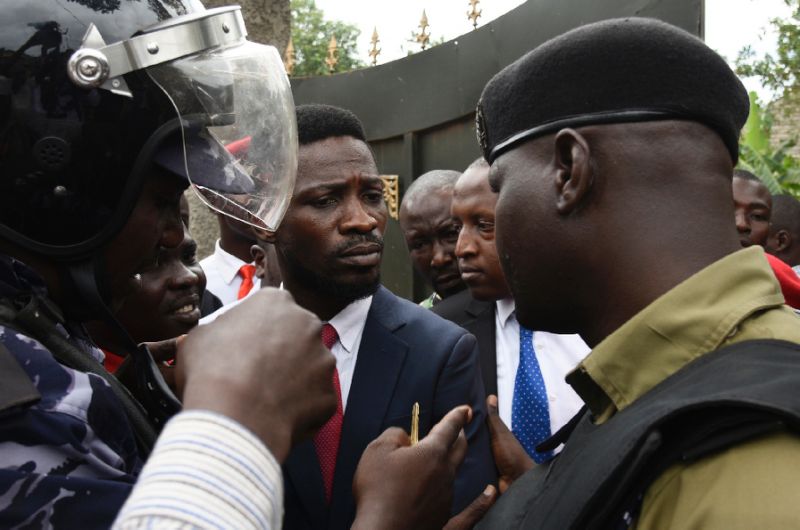
Ugandan police said Tuesday it had placed pop star MP Bobi Wine under "preventive arrest" as the fiery government critic warned his opposition movement would not be cowed into silence.
Wine's confinement under house arrest in Kampala came as the United States rebuked the government for its heavy-handed crackdown on the political opposition and urged it respect democratic rights.
In recent days, police cancelled one of Wine's concerts and fired tear gas at fans who rallied behind the colourful singer-turned-MP, who has emerged a potential challenger to veteran President Yoweri Museveni.
Wine, whose real name is Robert Kyagulanyi, tried to leave his home in the capital Tuesday only to come face-to-face with riot police encircling his leafy residence.
The singer, eschewing his trademark red beret for a dark suit and red tie, said he was "under siege" but would still urge supporters to exercise their right to demonstrate.
"This is our country", the 36-year-old local music sensation told reporters at the gates of his home.
Police spokesman Fred Enanga told AFP that Wine "planned to disrupt public order" and officers would stay put outside his home until further notice.
"The preventive arrest policy works when someone is about to commit a crime, and officers stop him from committing that crime," Enanga said.
Wine's charisma and music steeped in anti-government messaging has attracted a muscular response from Kampala, which has charged him with treason and repeatedly shut down his rowdy concerts that double as political rallies.
The cancellation of a much-hyped performance Monday sparked clashes between opposition supporters and baton-wielding police.
- People are 'fed up' -
The US embassy in Kampala rebuked the government for resorting to heavy-handed tactics.
"Strong leaders and states do not stifle speech –- they allow their citizens to participate fully and without fear in a vibrant multi-party democracy," the statement said.
Museveni seized power in 1986 at the head of a rebel army and has ruled Uganda ever since.
The Supreme Court last week upheld the constitutional validity of removing age caps for presidents, clearing the way for 74-year-old Museveni to run again.
But he faces a fight in Wine, who has rallied Uganda's youth behind his defiant music and provocative challenges to a leader twice his age.
Wine warned that the toppling of long-serving autocrats in Algeria and Sudan recently under the weight of popular protest had not gone unnoticed in Uganda.
"This is what we are left with -- to call on all Ugandans to protest peacefully until Museveni leaves power," Wine told AFP.
"Museveni should be aware the people are fed up and the earlier the better, he will be swept out of power."
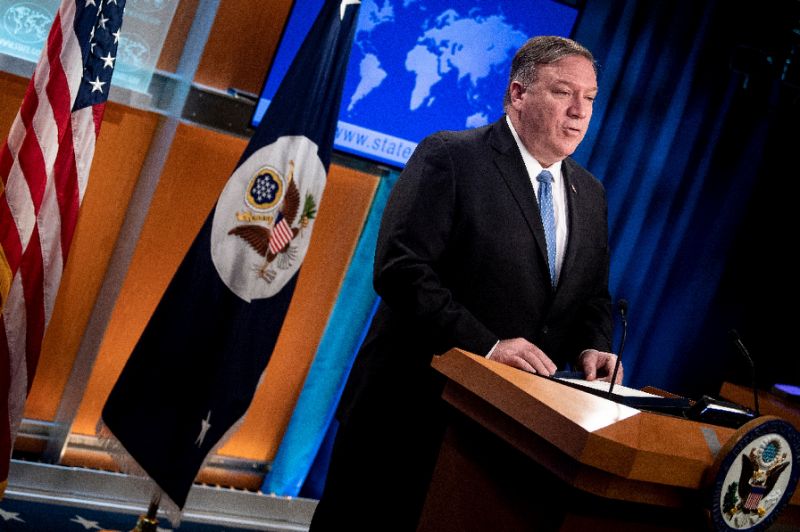
The European Union and Canada warned Wednesday of reprisals after the United States for the first time allowed lawsuits against foreign companies operating in Cuba, including EU and Canadian firms.
US Secretary of State Mike Pompeo announced Washington will on May 2 end routine wavers to the 1996 Helms-Burton act and allow for lawsuits over property seized by Cuba.
"The EU and Canada consider the extraterritorial application of unilateral Cuba-related measures contrary to international law," they said in a joint statement from Brussels.
It was signed by EU foreign policy chief Federica Mogherini and Trade Commissioner Cecilia Malmstrom, along with Canadian Foreign Minister Chrystia Freeland.
"We are determined to work together to protect the interests of our companies in the context of the WTO", the Geneva-based World Trade Organization.
"Our respective laws allow any US claims to be followed by counter-claims in European and Canadian courts," the three officials said.
"The US decision to allow suits against foreign companies can only lead to an unnecessary spiral of legal actions," they warned.
Mogherini and Malmstrom had previously sent a similar warning to Pompeo in a letter dated April 10, according to a copy of a letter obtained by AFP.
"Any person or company doing business in Cuba should heed this announcement," Pompeo told reporters in the US.
Under the Title II provision of the Helms-Burton Act, any companies that operate in property seized by Cuba during Fidel Castro's 1959 communist revolution could starting next month face lawsuits in US courts from the vast and politically powerful Cuban American diaspora.
- EU counter-claims threatened -
Pompeo called on all businesses that own buildings in Cuba to "fully investigate whether they are stolen in service of a failed communist experiment".
In their letter, Mogherini and Malmstrom urged Pompeo to stick to what they said was an agreement on managing policy differences over Cuba under which the US waived Title III and the EU suspended a threatened case at the World Trade Organization against Washington.
They said they were calling on Washington "to maintain a full waiver of Title III for EU companies and citizens", the letter said.
"Failing this, the EU will be obliged to use all means at its disposal, including in cooperation with other international partners, to protect its interests," they said.
"The EU is considering a possible launch of the WTO case," the letter added.
Mogherini and Malmstrom warned that "any claims in US courts would likely be followed by counter-claims by EU companies in EU courts", according to their letter.
Kimberly Breier, the top US diplomat for Latin America, said the United States would not issue any exemptions to the new law.
But Breier said businesses would only be affected if they operate in properties seized from Cubans who have emigrated to the United States.
"I think the vast number of European companies will not have any concerns operating in Cuba," she said.
Another senior US State Department official told reporters on condition of anonymity that "any European company, any American company, any company around the world that trafficks in property that was confiscated by the regime does have the possiblity of being hit by this legislation".
But the official could "not give an assessment on how many companies that applies to". AFP
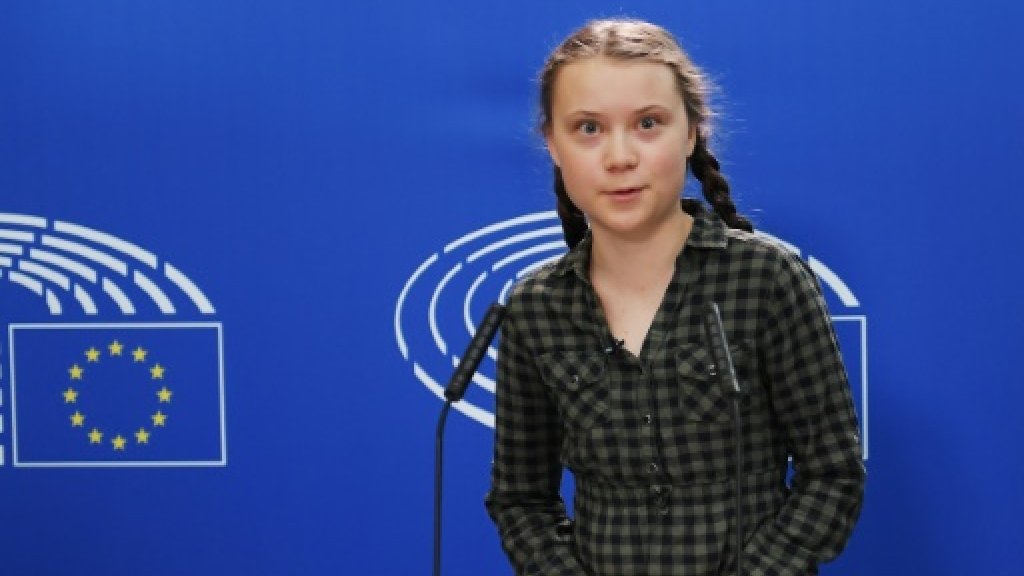
Sweden's teenage activist Greta Thunberg on Tuesday urged Europeans to vote in next month's elections on behalf of young people like her who cannot yet cast ballots but demand decisive action against climate change.
During a visit to the European Parliament in the French city of Strasbourg, Thunberg, 16, told a press conference that time is running out to stop the ravages of global warming.
"I'm not going to vote in the European election because I can't," she said, because she is too young to vote in Sweden.
"Therefore it's especially important for those who actually can vote to give us that in order to speak on behalf of people like me who are going to be affected very much by this crisis," Thunberg said in fluent but halting English.
Following a meeting with European Parliament President Antonio Tajani, Thunberg urged voters to use the opportunity to "influence the decisions" on climate taken by elected and appointed officials.
"We still have an open window that is not going be open for long in which we can act," she said. "So we need to take that opportunity to do something and they (politicians) should do something."
During a visit to Brussels in February, Thunberg urged the EU to double its ambition for greenhouse gas cuts, upping its target from 40 percent to 80 percent by 2030.
Under the 2015 Paris deal to limit global warming to well below 2 degrees Celsius, the 28-nation EU has pledged to cut greenhouse gas emissions by at least 40 percent by 2030, compared to 1990.
EU officials are now talking of increasing the figure to 45 percent.
The UN's Intergovernmental Panel for Climate Change (IPCC) has said warming is on track toward an unliveable 3C or 4C rise, and avoiding global chaos will require a major transformation.
Thunberg, who is due to speak to a parliamentary committee in the afternoon, has inspired tens of thousands of children worldwide to boycott classes to draw attention to climate change.
A demonstration calling attention to climate change is due to take place later Tuesday in Strasbourg before the parliament.AFP

Israeli President Reuven Rivlin on Wednesday formally handed Benjamin Netanyahu his letter of appointment to start building a coalition government following last week's general election.
In a televised ceremony, Rivlin told Netanyahu that in consultations with all parties elected to the incoming 120-seat parliament, "65 MPs recommended you".
Rivlin had sounded out delegations from political parties on Monday and Tuesday.
Only 45 members supported his main rivals from the Blue and White alliance led by ex-military chief Benny Gantz, with the 10 members of the Arab parties recommending nobody.
"This is the fifth time I am taking on the task of putting together the government of Israel," Netanyahu said at Wednesday's ceremony.
"There is no greater privilege in democratic life."
In his remarks Rivlin referred to the election campaign, which candidates and commentators agreed had been exceptionally brutal.
"Things were said that should not have been said, from all sides," he said.
Netanyahu then pledged to serve all Israelis, opponents as well as supporters.
"I am well aware of the size of the responsibility placed upon my shoulders and shall act as the envoy of all of the people, those who voted for me and those who did not," he said.
He now has 28 days to form a government, with a possible extension of a further two weeks.
The results from the April 9 election put Netanyahu on course to become Israel's longest-serving prime minister later this year, surpassing the state's founding father David Ben-Gurion.
- Coalition demands -
The 69-year-old's first task will be to reconcile divergent demands from his likely coalition partners.
They include ultra-Orthodox Jewish parties and the strongly secular Yisrael Beitenu of former defence minister Avigdor Lieberman.
Netanyahu's outgoing government was seen as the most right-wing in Israel's history, and the next is expected to be similar if not further to the right.
Lieberman has said he would condition his joining the coalition on the adoption of a law aimed at drafting ultra-Orthodox Jews into the military like their secular counterparts.
Ultra-Orthodox Jews studying at religious seminaries are currently exempt from mandatory military service, a situation many Israelis see as unfair.
But attempts to change the law have met with strong opposition from ultra-Orthodox political parties, which won 16 seats in the incoming parliament.
On Tuesday, United Torah Judaism -- one of the two ultra-Orthodox parties -- stressed they were not prepared to compromise over Lieberman's demands, even at the risk of Netanyahu failing to form a coalition.
"We have already proven we won't have a problem to face another election," the party said in a statement.
Ultra-Orthodox Jews make up some 10 percent of Israel's population of nearly nine million.
The coming months are also expected to see the unveiling of US President Donald Trump's long-awaited plan for Israeli-Palestinian peace.
Trump has shown no sign so far that he would be willing to make significant demands of his close ally Netanyahu in connection with his plan, though even minor concessions to the Palestinians could spark opposition from the Israeli premier's far-right coalition partners.
Before the election, Netanyahu pledged to annex West Bank settlements in a move that would make Palestinian statehood all but impossible if done on a large-scale.
He will now face pressure to follow through but Israel's UN ambassador said Wednesday that nothing would be done on the issue before the Trump plan is revealed.
"We will wait. We will see the plan. We will engage and I don't know where it will lead us," Ambassador Danny Danon told reporters.
But the biggest danger hanging over Netanyahu is his potential indictment on charges of bribery, fraud and breach of trust.
Israel's attorney general has announced his intention to indict Netanyahu, pending an upcoming hearing. He would be the country's first sitting prime minister to be indicted.
Netanyahu is not legally required to resign if indicted, only if convicted with all appeals exhausted, but political pressure would likely be intense.
Many analysts said one of Netanyahu's main motivations in calling early elections was to be able to confront the charges with a fresh electoral mandate behind him.AFP
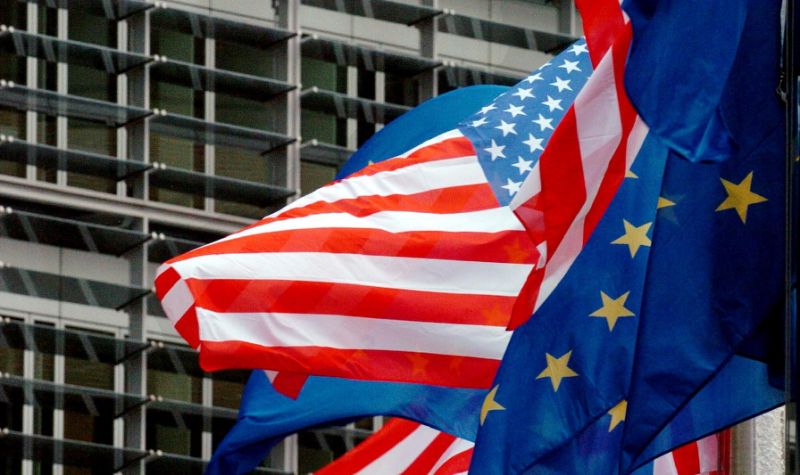
European Union countries on Monday overruled France and gave the green light for Brussels to open trade talks with Washington as soon as possible and defuse trans-Atlantic tensions.
Read more: EU green lights trade talks with Washington to defuse tension
